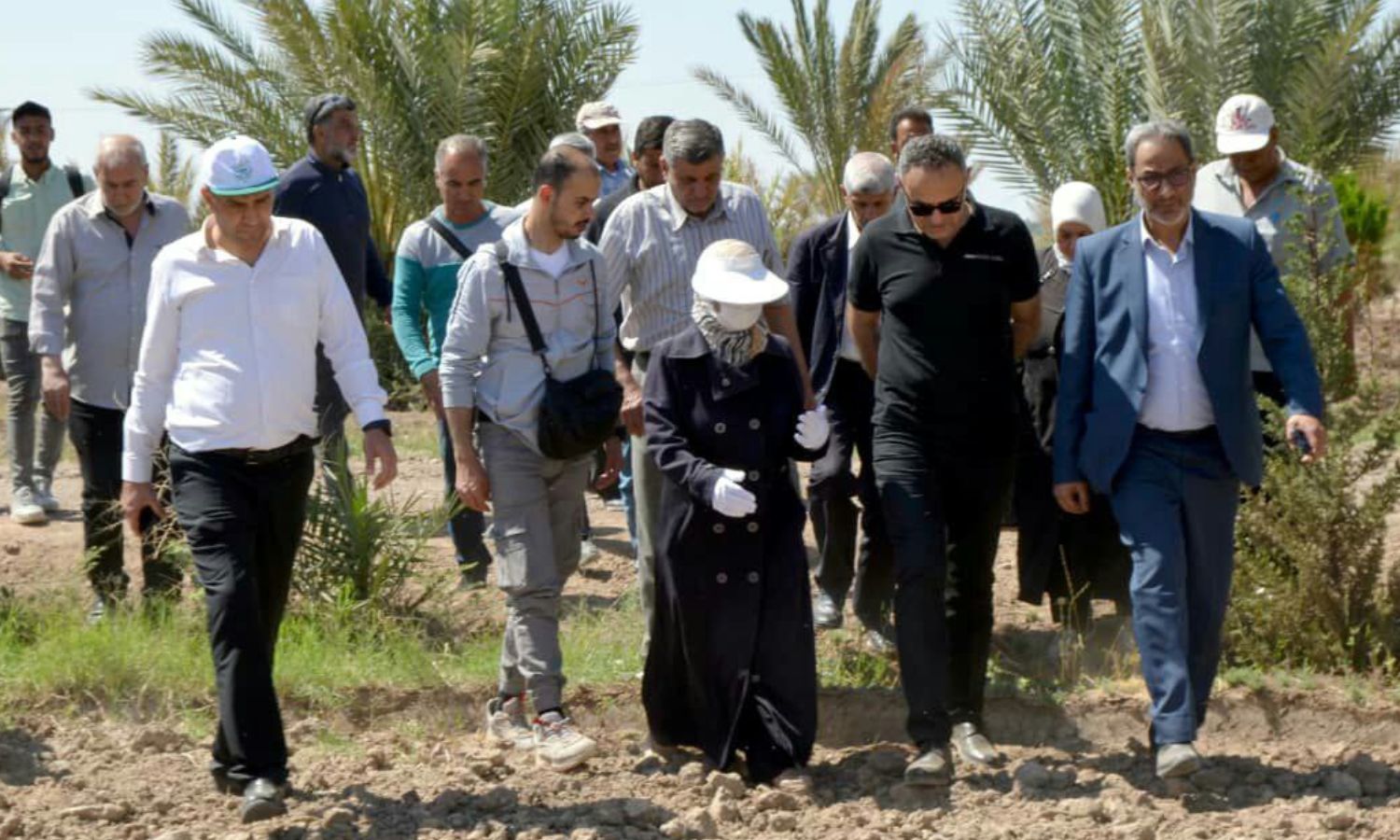Deir Ezzor – Obadah al-Sheikh
With the onset of the pollination season, date palm farmers in Deir Ezzor, eastern Syria, are pinning their hopes on good production and a promising season, as this tree represents an integral part of their identity and heritage.
The date palm pollination season starts in early April and ends in mid-May, depending on the climatic conditions of the region, varying from one area to another. Most date farm owners pollinate the trees themselves or employ daily workers for a wage of 50,000 Syrian pounds a day.
Farmers traverse the date palm orchards spread along the banks of the Euphrates River, carrying with them the male inflorescences or “shamarikh” laden with golden pollen to pollinate the female flowers and ensure the proper and abundant development of fruits.
Methods of pollinating date palms vary between traditional techniques that involve climbing the palm trees and manually placing the male inflorescences inside the female clusters, and modern methods that use air pumps for dispersing pollen in some smaller farms.
Inherited customs and traditions
The people of Deir Ezzor welcome the pollination season with special rituals. Preparations begin weeks in advance by preparing and cleaning the orchards. As the first male inflorescences appear, farmers set off on a journey up the palms to pollinate the female flowers, carrying with them the wisdom of their ancestors and simple tools.
Salem al-Maslat, a date palm farmer from al-Bukamal city in eastern Deir Ezzor, stated that farmers learned this profession from their fathers and grandfathers, considering it not just a job but a “craft and love for the palm tree.”
He added to Enab Baladi that each type of date palm has its own timing and method of pollination, which farmers know through experience and practice. He pointed out that women and children participate in other aspects of the date palm pollination process, such as gathering male inflorescences and preparing meals for the farmers during long days of work in the orchards.
Hajj Ali al-Saleh (65 years old), a date palm farmer from eastern Deir Ezzor countryside, shared with Enab Baladi the importance of this phase, saying, “The pollination season is the lifeblood of date production.”
He added that if pollination is not done well and in a timely manner, farmers lose a significant portion of their harvest, emphasizing that this process requires patience, precision, and knowledge of the types of date palms and their flowering times.
He mentioned that farmers eagerly await this season as it represents a source of livelihood for many families in the region, hoping that this year will be a blessed season compensating for some of the losses in recent years.
Agricultural engineer Ragheb al-Haneesh from al-Bukamal city told Enab Baladi that pollinating date palms is essential for ensuring fruit production and improving its quality and quantity, as it is the foundation for a successful date season.
The engineer pointed out the main pollination mistakes leading to failure, which include improper timing for using pollen, insufficient quantity, or poor distribution.
As for the date harvesting time, it usually occurs about 5-8 months after pollination, as the fruits go through different growth stages until reaching the stage of dates and full ripeness.
Challenges facing farmers
Despite the importance of the pollination season, several farmers met by Enab Baladi in the al-Siyal town in eastern Deir Ezzor reported that they face numerous challenges, including rising labor costs, especially with many youth migrating in search of other job opportunities.
Farmers also contend with water scarcity and its impact on the growth and production of date palms, difficulties in obtaining fertilizers and pesticides, and rising prices in local markets, alongside the effects of remnants of war and potential mines in some agricultural areas, hindering access to certain orchards.
The date palm sector in Deir Ezzor needs more support and attention from the relevant authorities, providing technical and financial assistance to farmers to confront challenges, improve production quality, and increase competitiveness in the markets.
On April 28, a scientific seminar was held to discuss the reality of date palm cultivation and ways to invest in this wealth and develop it, under the title “Good Practices for Date Palm Pollination,” attended by Minister of Agriculture Amjad Badr and Deir Ezzor Governor Ghassan al-Sayed Ahmad.
Annually, the “Date Palm” festival is held in al-Baghouz town on the Syrian-Iraqi border in eastern Deir Ezzor to highlight the agricultural heritage of the town and the date palm culture among its residents and farmers.
Al-Baghouz has nearly 10,000 date palm trees, around 2,500 of which have been damaged or burned, or were affected by shells, explosions, and shrapnel during the battles that previously took place in the region between the Syrian Democratic Forces (SDF) and the Islamic State group.
Date palm pollination season gains momentum in Deir Ezzor Enab Baladi.
Read More Details
Finally We wish PressBee provided you with enough information of ( Date palm pollination season gains momentum in Deir Ezzor )
Also on site :
- Metal Ions: The Next Frontier in Diabetes Management?
- Starmer to send failed asylum seekers abroad - a year after Rwanda scheme scrapped
- Syrian leader says lifting of US sanctions 'historic and courageous'

